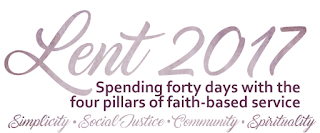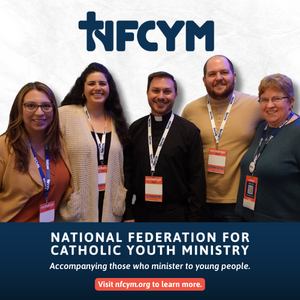By Molly Trainor, former Benedictine Volunteer
Today John tells of Jesus healing a man born blind. When others learn that the man can see, they ask themselves, “Isn’t this the beggar who used to sit on the side of the road?” Then when the man tries to testify to the merciful power of Jesus, they cast him out, saying that he is just a sinner, unqualified to teach them.
Too often, it’s easy to be discouraged from serving others because we feel like the blind man in today’s Gospel. During my time of service with Benedictine Volunteers, I struggled with this a lot. I asked myself why I thought I could help others, when I myself struggled with so much, as if I had to be perfect in order to give anything.
The blind man shows us that this is far from the truth. The things that make us broken are those same things that Jesus uses to heal us, to make us instruments for others. The beggar’s blindness is the reason he finds Jesus and the reason he is so willing to preach about Jesus’ mercy.
As I read this Gospel, I see that my blindness is not something that should hold me back from service. My imperfections are what make me realize the need for God in my life and give me the courage to address that need with gentle love in the lives of others. Instead of being ashamed of my brokenness, I should allow God to use it to help heal others.
Prayer:
Focus on: Spirituality: It’s difficult to beg, but it is only in begging that we truly realize our need. Ask yourself, in what ways am I avoiding healing in my spiritual life? Beg God for the sight to see what you might not want or be able to see on your own. Then beg for the help and encouragement to transform your weaknesses into strengths. Like the blind man, beg that your past struggles allow you a deeper faith in Jesus Christ.
Service Inspiration: Someone who has allowed God to transform her wounds into a beautiful witness of faith is singer Audrey Assad. I had the privilege of hearing Assad’s testimony and she inspired me to allow God to use my brokenness. She helped me realize that in admitting our weakness, we allow others to see that all our strength comes from God. Her music gives me the strength to say that my weakness is a tool to serve others for the glory of God.
Forty Days with the Four Pillars of Faith-Based Service: This reflection is part of our annual Lenten Reflection Guide, a collection of reflections written by current and former volunteers. We are pleased to offer this resource through our partnership with the Catholic Apostolate Center.
To download the Lenten Reflection Guide, please click here.
About the Author: Molly was an English major at Franciscan University of Steubenville. Last March, she went on a Mission of Peace to Gallup, New Mexico with my her University. Formerly she served as a volunteer with Benedictine Volunteers, where she lived and served with the sisters of Mother of God Monastery in Watertown, South Dakota.




 Thousands of faith-based service opportunities can be at your fingertips with the RESPONSE. Download the latest edition today!
Thousands of faith-based service opportunities can be at your fingertips with the RESPONSE. Download the latest edition today!
